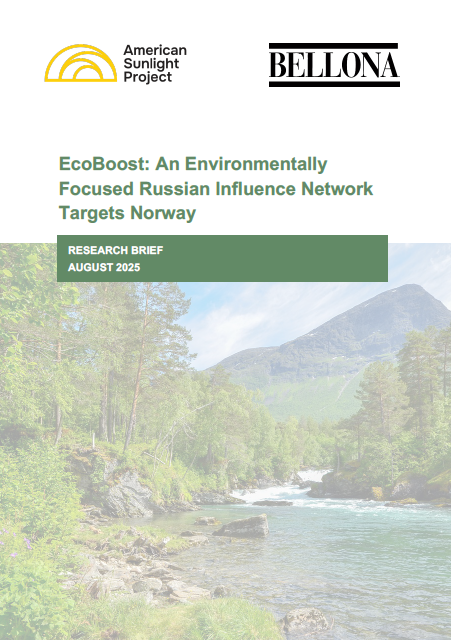
EcoBoost: An Environmentally Focused Russian Influence Network Targets Norway
The American Sunlight Project and the Bellona Foundation show in this brief how the Russian bot network EcoBoost systematically manipulates climate a...
Publication

Publication
Last week, the Commission proposed to postpone the implementation of the Stage V requirements of the non-road mobile machinery (NRMM) Regulation for 12 months due to COVID-19. Bellona recognises that this is an extraordinary situation, however in dealing with the current crisis we must not lose sight of the next one, the climate crisis.
This Commission proposal will fall under the responsibility of the Environment, Public Health and Food Safety Committee and will be discussed on June 10th. This proposal came after six industry associations representing the non-road mobile machinery sector called on the EU to postpone the deadlines for emission limits. ‘The co-signatories point out that the COVID-19 outbreak is causing complete interruptions of supply of parts and components,’ the associations wrote. The Commission’s proposal states that delaying Stage V implementation ‘has no environmental effects since the measures facilitate the placing in the market of goods fitted with engines produced before the pandemic.’ However, the apparent absence of environmental impact a delay would have is very much limited to these market-focused elements. From a climate & health perspective, any delay in the use of cleaner engines implies that old engines will continue to be used which do not fulfil Stage V requirements, thereby jeopardising people’s health and continuing to ignore the need for climate action. Furthermore, considering that the NRMM Regulation only limits the pollution of new machines entering the market, a delay presumably means that old NRMM engines will be used for longer and that the environmental impact of such a delay will be felt for years to come. This potentially harmful impact is additional to the fact that the Stage V of the Regulation, which appears to be the final stage, does not consider the impact of fossil fuels as it doesn’t limit CO2 emissions from non-road vehicles in any way.
While these are challenging times, the current situation should not be an excuse to reduce environmental ambition. In fact, there is the unique chance for a green recovery to push for change and benefit everyone universally.
Bellona calls on the EU to take leadership in decarbonising non-road mobile machinery, by requiring manufacturers’ to submit a detailed strategy on how each manufacturer plans to comply with the EU’s target of climate-neutrality by 2050. This can then be used to engage constructively with the sector.
NRMM manufacturers have been able to escape climate action in the past, which makes this green recovery period ideal to get the market involved. As there is currently no climate strategy for the NRMM sector, this gives manufacturers the opportunity to prove their ability to be Paris and Green Deal compliant. With the NRMM Regulation having failed to address NRMM engine caused greenhouse gas emissions, and the fact that there is currently no revision planed, this potential delay offers an ideal chance to bring the sector on a path of reducing and eventually phasing out its emissions.
As for EU Policy, any further legislation regarding the NRMM sector should take the next logical step, which is limiting greenhouse gas emissions, aiming towards a zero emission target.